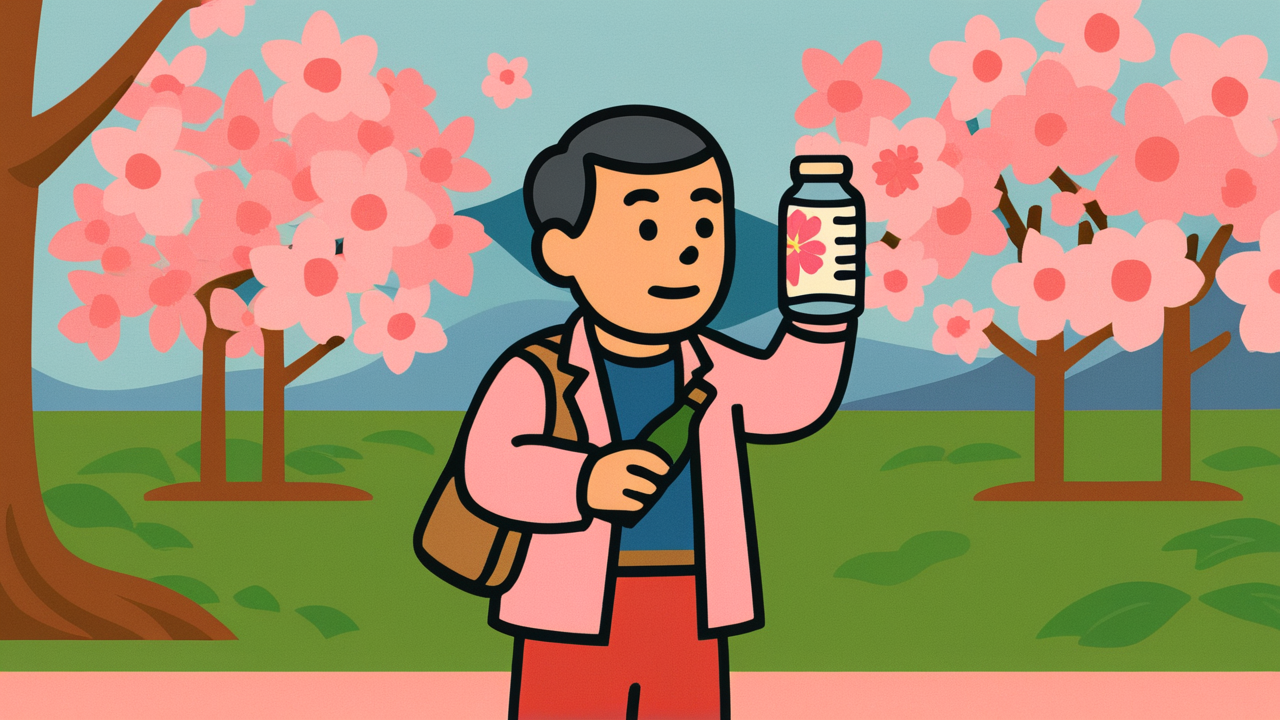How to Read “酒なくて何の己が桜かな”
sake nakute nan no ono ga sakura kana
Meaning of “酒なくて何の己が桜かな”
This proverb means “Without sake, it cannot be called true cherry blossom enjoyment for oneself.”
In other words, it expresses that in order to truly enjoy something from the heart, the accompanying elements and atmosphere-setting are important. It’s not just about looking at cherry blossoms, but the idea that one can truly taste the essence of hanami only when there’s time to drink sake while conversing with companions and celebrating the arrival of spring. This proverb teaches us that to obtain the essential enjoyment of things, superficial actions alone are insufficient – elements and environments that enhance the experience are necessary. Even today, it’s used to express the feeling of wanting something to liven up the occasion when spending precious time.
Origin and Etymology
The origin of this proverb is thought to lie in the haikai culture of the Edo period. “Without sake what of self cherry blossoms” was originally born as a verse composed in haiku form.
During the Edo period, hanami was one of the great pleasures of common people. When cherry blossom season arrived, people would gather under the sakura trees with packed lunches and sake, and the custom of enjoying food and drink while admiring the flowers became established. Against this cultural background, it’s presumed that this verse was born as an expression of the feeling that “if you’re going to view cherry blossoms, you can’t begin without sake.”
The expression “onore ga sakura” (self cherry blossoms) contains the meaning of “cherry blossoms for oneself” or “one’s own way of enjoying cherry blossoms.” In other words, it shows the idea that not just gazing at cherry blossoms, but admiring sakura while drinking sake is what constitutes true hanami for that person.
This verse eventually became established as a proverb as a unique expression that fused Japanese seasonal sensibility with sake culture. It can truly be called a distinctly Japanese proverb, born from the combination of hanami, a uniquely Japanese culture, and sake, an indispensable element of it.
Usage Examples
- For this year’s hanami too, “Without sake what of self cherry blossoms,” so I decided to bring beer after all
- To be abstaining from alcohol during such a wonderful cherry blossom festival – this is truly “Without sake what of self cherry blossoms”
Modern Interpretation
In modern society, the interpretation of this proverb has also diversified. As more people who don’t drink alcohol increase, many have come to interpret the “sake” part as “something special.”
For example, in the SNS era of hanami, taking beautiful photos or bringing favorite cafe drinks functions as “modern sake.” Also, for family hanami, children’s favorite sweets and juices probably play the same role as sake does for adults.
With the development of technology, ways of enjoying hanami have also changed. Playing music, bringing games, aerial photography with drones – the “added value” for enjoying cherry blossoms has expanded infinitely.
On the other hand, with the rise of health consciousness, there are voices questioning the sake culture of this proverb. However, essentially, because it expresses the universal human psychology that “special times require special staging,” it continues to be inherited as wisdom applicable to modern times while changing its form.
During the COVID pandemic, a new form called online hanami was born, creating a culture of “cheers” even through screens. This can also be said to be an example of modern interpretation of this proverb’s spirit.
When AI Hears This
The expression “my own cherry blossoms” in this verse represents a revolutionary concept in Japanese aesthetics. While Western aesthetics views cherry blossoms as objectively beautiful objects, here they are completely subjectified as “my cherry blossoms.” This embodies a distinctly Japanese philosophy of beauty where the beauty of cherry blossoms only comes into being through the inner state of the observer.
Particularly noteworthy is the phrase “without sake.” This isn’t merely a craving for alcohol, but rather indicates the necessity of a “mental preparatory state” for receiving beauty. Cognitive science research shows that aesthetic experiences are closely linked to the release of dopamine and serotonin in the brain, and we feel beauty more intensely when in a relaxed state. People in the Edo period intuitively understood this psychological mechanism without knowing the scientific basis.
Modern marketing also emphasizes “experiential value,” which is precisely the concept this 300-year-old verse already expressed. Just as Starbucks sells not just coffee but “the experience of a third place,” cherry blossoms are valued not merely as flowers but as “special moments shared with sake.”
The personalization of “my own cherry blossoms” also reflects the unique Japanese view of nature—not as something to be conquered, but as an entity to unite with oneself. This subjective aesthetic forms the very foundation of Japanese culture.
Lessons for Today
What this proverb teaches us today is “the importance of devising ways to enrich experiences.” In our busy daily lives, we tend to focus only on efficiency and results, but truly memorable times are born from the special thoughts and staging we put into them.
It doesn’t necessarily have to be expensive things. Time spent with important people, favorite music, homemade lunch boxes – such small “extras” can transform ordinary moments into special memories.
In modern society, digitalization has progressed and many things have been simplified. But precisely because of this, the attitude of consciously adding “one’s own specialness” becomes important. Coffee time during work breaks, meals with family, walks with friends – try to find your own “sake” in such daily life.
Life is once only. If we’re going to see the same cherry blossoms, if we’re going to spend the same time, we want to remember to devise ways to truly enjoy it. What is your “sake”?



Comments